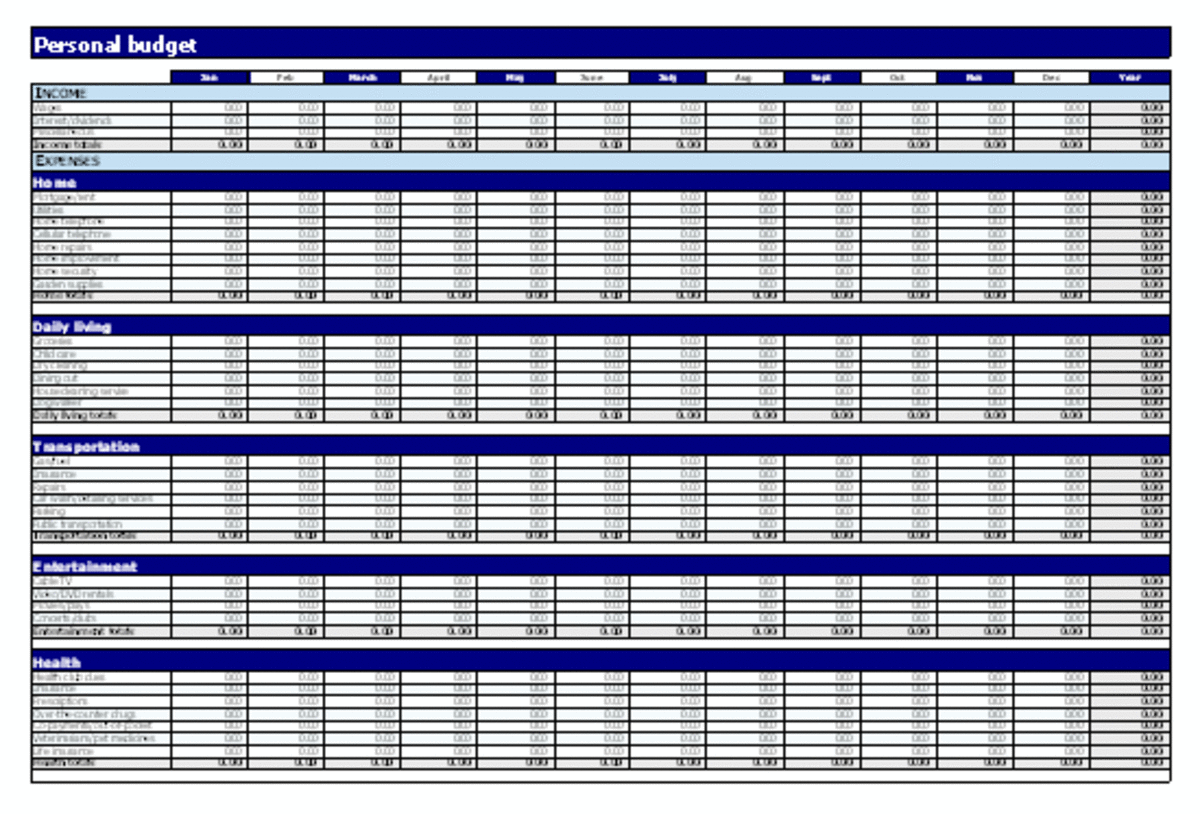How to Manage Your Family's Household Finances - A Practical Guide
Household financial matters and issues are among the top factors contributing to serious family problems and marital woes. Every household has dozens of monthly expenditures – from mortgage costs such as house or car payments, food, electric, gas, water, internet and phone bills to utilities, other commodities, and even for entertainment. If a couple starts to discuss about their household expenditures without proper record and accounting, this may lead them to also start asking each other where their money has gone. This very common scenario is more likely to end up in disagreements or a more negative outcome. And the worst is when the problem continues to be left unresolved, it may even lead to a more serious financial as well as marital problem causing families to break. To some, it can even lead to divorce.

"Put not your trust in money, but rather put your money in trust." - Oliver Wendell Holmes
Therefore, proper management of your household finances and keeping track of your money especially if you are married and have children is very crucial. Yet to some of us, it can also be a daunting task. It requires making a plan, setting goals, commitment, and most of all - personal discipline. Without a proper family budget and recording, credit and debit cards, checks, cash, automatic withdrawals as well as other household miscellaneous expenses can just leave you wondering at the end of each month about where your money has gone. Worst of all, if you keep on accumulating debts, it will later become harder and harder for you to pay them off.
Read below for some practical tips to guide you in managing your household finances.

"A penny saved is a penny earned." - Benjamin Franklin
Set your goals early.
Many people begin overhauling their finances when they are already in deep financial trouble. Frustrated with their current position, they start to make drastic changes with their lives and make large commitments such as instantly cutting off their household expenses in half –something that may not always come as easy as it sounds. So in the end, these all-of-a-sudden big commitments are most likely to fail. To avoid this, it is important that you should start setting your goals early on. For instance, if you really want to save by cutting costs, you can start by making just a little extra effort in reducing your cell phone, telephone, cable and internet bills, as well as with electric, water, and gas bills every month. Educate the whole family on how to save on household expenses by turning off the lights when they leave the room, turning off the television when no one's watching, closing the water tap while brushing teeth or while washing at the sink, etc. Moreso, you can also start making small commitments to yourself such as not buying anything new unless there is really a need to do so, or sell your old and unused things before purchasing new ones, and eating out only once a month for family treats. If you start setting your goals early with a series of small yet realistic victories, this will help prevent you from making difficult commitments and drastic changes in your way of life later on.

“Never spend your money before you have it.” -Thomas Jefferson
Make a family budget.
Sit down with your spouse and start planning a family budget together. Working through a budget plan with your family such as cutting off expenses and start saving requires that your family household expenses among other things should be well planned. This simply means that you have to decide in advance where and how your money shall be spent. This will help save you and the other members of the family from impulse-buying and shopping for unnessary items. When a certain purchase is not included in the budget, it makes it easier for you to realize that the item is actually just a want – not a need. This makes walking away from frivolous purchases to become more easier.
Start your family financial budget plan on how much you’ll be spending on household necessities every month such as your fixed monthly expenses like house rental or payment, food, gas, electricity, cable tv, water, credit card payments, insurance, as well as other miscellaneous expenses and subtract it from both your monthly incomes. Whatever is left (if there are any) can be allocated for spending non-essentials and the rest can be turned into savings - such as putting a specific amount away for an emergency savings plan. By maintaining a detailed family budget and keeping updated records of income and expenditures, it will help you keep your household finances in order and well-managed.
Stick to your plan.
To get your household finances in order, you and your family will need to follow your budget plan and stick to it. Many individuals want to make commitments to themselves such as to “save more money” or “spend less” but aren’t really quite serious in making it to happen. Unplanned purchases such as impulse-buying will only give you more financial trouble later on. If you’re really serious in achieving your goals which is - to save money and spend less, then you and the members in your family have to follow your financial plan and stick to it. Sometimes, setting a specific numeric goal in your financial plan such as saving an extra $150 every month or cutting off on your electricity, gas or phone bills as well as your grocery expenses by 10-15% would do more good rather than just setting a vague financial goal. Finding great shopping deals, hitting up thrift stores and local outlets, and keeping a grocery check list close at hand whenever you go shopping - all these little efforts combined will really help you to spend less and save more money on your pocket. (Check out the video to get tips on how to stick to your budgeted plan and put your household finances in order through the "envelope system").

"Creditors have better memories than debtors." -Benjamin Franklin
Record your expenses.
Keep a record of all your household expenditures including your fixed monthly expenses, debit and credit card transactions, as well as monthly bank service charges. When these expenses are left unrecorded, they can sometimes mess up with your account balance and on your family budget. Keep all your records accurate and up-to-date, and put them in a safe place for future reference. You can also set up access to your bank account online in order to check your account balance regularly. If you fail to keep track of expenses that keep coming up including your eating out, unplanned entertainment and social events, family outdoor activities such as campings, vacations, and other out-of-the-city travel costs, etc., your family budget will most likely be put in jeopardy.
How does it feel managing your household finances?
Managing household finances doesn’t really happen overnight, but it shouldn't also be intimidating as well. It's just a matter of checking and recording your family’s expenditures, planning a family household budget and sticking to it, cutting off expenses, and adding a little extra effort, sacrifice, and self-discipline. If you and your family will be as one on this goal, you’ll be more likely to be shaving cents and dollars at the end of each month out of your daily household expenses.
“The art of living easily as to money is to pitch your scale of living one degree below your means.” – Sir Henry Taylor

You Might Also Like:
- How to Vacation With Your Family on a Budget
Who wouldnt want to go on a travel vacation without spending too much on the pocket? I bet everyone does. Yet in this tight economy we are living, traveling for a family vacation without a plan to save... - Types of Credit Cards and How to Choose One Thats Right For You
Credit cards are indeed very convenient. Theyre not just easy to get but they are also very convenient to use - and a lot more safer to carry than cash. Everyday, you are probably bombarded with various... - How to Sign-Up and Make Money using Commission Junction
CJ Cheque Things You'll Need: Desktop or laptop computer A website or blog that you originally developed Internet connection If you are a publisher who owns a website or blog, you can...












